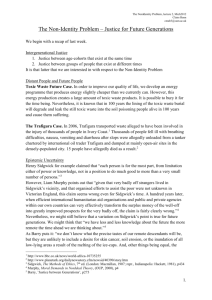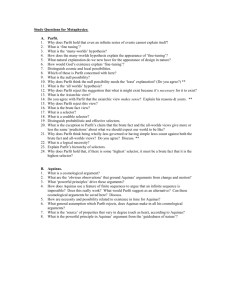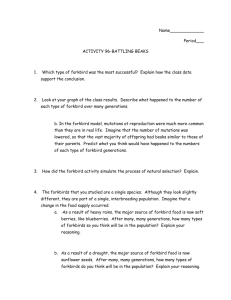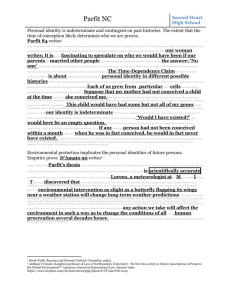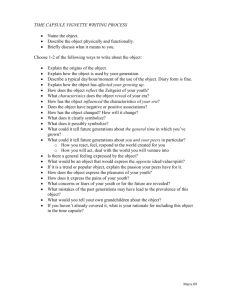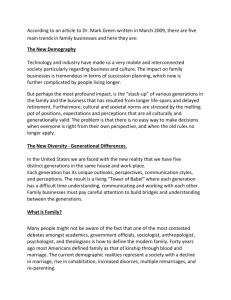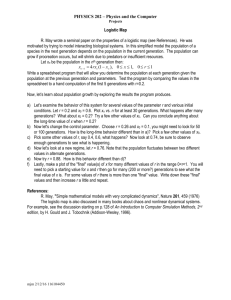Word - Anthony D`Amato
advertisement
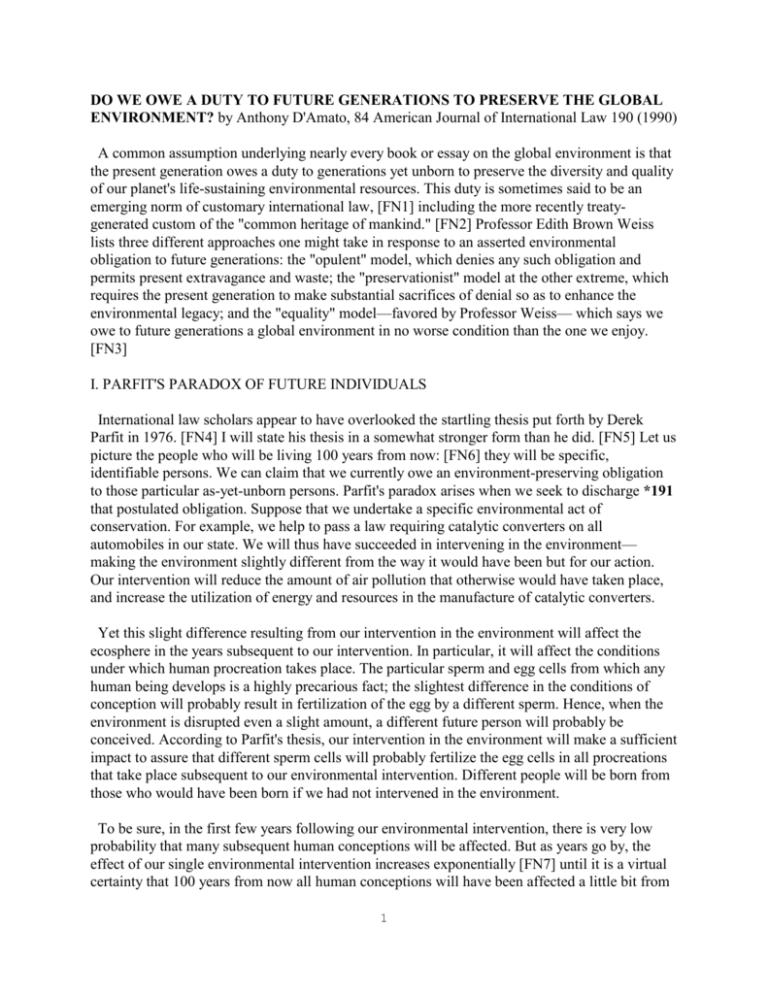
DO WE OWE A DUTY TO FUTURE GENERATIONS TO PRESERVE THE GLOBAL ENVIRONMENT? by Anthony D'Amato, 84 American Journal of International Law 190 (1990) A common assumption underlying nearly every book or essay on the global environment is that the present generation owes a duty to generations yet unborn to preserve the diversity and quality of our planet's life-sustaining environmental resources. This duty is sometimes said to be an emerging norm of customary international law, [FN1] including the more recently treatygenerated custom of the "common heritage of mankind." [FN2] Professor Edith Brown Weiss lists three different approaches one might take in response to an asserted environmental obligation to future generations: the "opulent" model, which denies any such obligation and permits present extravagance and waste; the "preservationist" model at the other extreme, which requires the present generation to make substantial sacrifices of denial so as to enhance the environmental legacy; and the "equality" model—favored by Professor Weiss— which says we owe to future generations a global environment in no worse condition than the one we enjoy. [FN3] I. PARFIT'S PARADOX OF FUTURE INDIVIDUALS International law scholars appear to have overlooked the startling thesis put forth by Derek Parfit in 1976. [FN4] I will state his thesis in a somewhat stronger form than he did. [FN5] Let us picture the people who will be living 100 years from now: [FN6] they will be specific, identifiable persons. We can claim that we currently owe an environment-preserving obligation to those particular as-yet-unborn persons. Parfit's paradox arises when we seek to discharge *191 that postulated obligation. Suppose that we undertake a specific environmental act of conservation. For example, we help to pass a law requiring catalytic converters on all automobiles in our state. We will thus have succeeded in intervening in the environment— making the environment slightly different from the way it would have been but for our action. Our intervention will reduce the amount of air pollution that otherwise would have taken place, and increase the utilization of energy and resources in the manufacture of catalytic converters. Yet this slight difference resulting from our intervention in the environment will affect the ecosphere in the years subsequent to our intervention. In particular, it will affect the conditions under which human procreation takes place. The particular sperm and egg cells from which any human being develops is a highly precarious fact; the slightest difference in the conditions of conception will probably result in fertilization of the egg by a different sperm. Hence, when the environment is disrupted even a slight amount, a different future person will probably be conceived. According to Parfit's thesis, our intervention in the environment will make a sufficient impact to assure that different sperm cells will probably fertilize the egg cells in all procreations that take place subsequent to our environmental intervention. Different people will be born from those who would have been born if we had not intervened in the environment. To be sure, in the first few years following our environmental intervention, there is very low probability that many subsequent human conceptions will be affected. But as years go by, the effect of our single environmental intervention increases exponentially [FN7] until it is a virtual certainty that 100 years from now all human conceptions will have been affected a little bit from 1 our single act of environmental intervention, and that this little effect will actually result in fertilization of egg cells by sperm cells different from those that would have fertilized those egg cells in the absence of our act. Parfit's conclusion is that every single person alive 100 years from now will be an entirely different individual from the person he or she would have been had we not intervened in the environment. This fact creates a paradox in our attempt to discharge our moral obligation to future generations. How can we owe a duty to future persons if the very act of discharging that duty wipes out the very individuals to whom we allegedly owed that duty? Our attempted environmental altruism will prevent the birth of the precise beneficiaries of our altruism. It is no answer to argue that the entirely new set of individuals who will replace those we wipe out will themselves greatly benefit from our intervention. For although they may be the beneficiaries of our environmental intervention, we could not have owed a duty to them because they were not probable persons at the time we claimed that we had a duty. Any present duty that we have to future generations can only be a duty to particular future persons who are awaiting their turn to be born. If in exercise of such an alleged duty we commit an act of environmental intervention that denies *192 the opportunity to be born to those very individuals, we cannot possibly be making them better off by virtue of our intervention. Thus, we find that any attempted altruism on our part to intervene in the environment to help future persons will make those persons incomparably worse off than if we had not intervened. They would be better off living in a degraded environment 100 years from now—that is, in an environment we did not act to preserve—than not living at all. [FN8] Parfit's paradox is uncomfortable and counterintuitive. Is it somehow fallacious? If not, is there any way we can accept Parfit's thesis and still make sense of the notion of "obligation to preserve the environment"? II. IS PARFIT'S REASONING FAULTY? People encountering Parfit's thesis for the first time are properly skeptical that a minor intervention in the environment can actually result in entirely different individuals in 100 years from those who would have existed then had there been no such intervention. But the result is scientifically accurate, stemming from the discovery in recent years of chaos theory. In the 1950s, Edward Lorenz, a meteorologist at the Massachusetts Institute of Technology, discovered that a very slight shift in the initial data about weather conditions fed into a computer will result in drastic differences in simulated weather conditions after a number of iterations. [FN9] The differences, or perturbations, grow exponentially, doubling every 4 days. Lorenz called this the "butterfly effect." An environmental intervention as slight as a butterfly flapping its wings near a weather station will change long-term weather predictions. Although 2 weeks after the butterfly's capricious flight the effect will hardly be felt outside an area 16 times the path of the butterfly, after 1 or 2 years the butterfly's flight could actually be the cause of a major storm that otherwise would not have taken place. [FN10] A weekly quadrupling rate means that an initial perturbation will increase by 4 to the 52d power after just 1 year—enough to make itself felt anywhere on the planet. By my own rough calculations, after 3 years the number of perturbations will have 2 increased by more than the total number of atoms in the universe. Thus, applying chaos theory in support of Parfit's thesis makes clear that any action we take will affect the environment in such a way as to change the conditions of all acts of human procreation several decades hence. Even minor acts in the present can substantially affect which particular sperm cells succeed in fertilizing human ova 60 years from now. If there is no valid scientific objection to Parfit's thesis, can we argue that it proves too much? Can we argue that any act that we do, not just acts of environmental preservation, will have a similar exponentially increasing *193 future effect? [FN11] For instance, a jogger will have this effect on the future, just as will the air-polluting automobile that drives by her as she jogs. Can we thus contend that since acts of environmental degradation as well as acts of environmental preservation equally change the composition of future populations, Parfit's thesis is vacuous? No, because Parfit's thesis is aimed at moral considerations. It is premised on the generally accepted moral obligation not to act in any situation where our action would make others worse off. [FN12] Hence if we engage in an act of environmental preservation for the reason that we feel an obligation to future persons, our very act will make those persons worse off than if we had not acted at all; indeed, our act will make them totally worse off—they will be deprived of their existence. To be sure, the same is true of any environmentally degrading act that we might take—except that no one claims that we owe an obligation to future generations to degrade the environment! Parfit's thesis is thus pinpointed at only one claim of obligation: that if we act to preserve the environment out of a sense of obligation to future persons, that obligation is nonsensical because in so acting we destroy the obligees. Indeed, this theme could be embellished by pointing out that all environment- preserving actions are supererogatory in contrast to all selfish uses that we might make of the environment. The argument would proceed as follows. Imagine that we could have a conversation with a lawyer who represents the class of actual persons who will be alive 100 years from now. She tells us that she is prepared to accept just our selfishly motivated environmental acts. For when we act to use up environmental resources just to gratify our immediate desires, we are at least motivated by an understandable *194 reason—the reason of self- interest. True, she adds, those acts will operate to change the conditions of future human procreation in such a way that the class of persons she represents will change its members' identities each time we act. But she accepts this result as inevitable. On the other hand, she strenuously objects to any of our acts of environmental intervention that are motivated solely by a sense of obligation to her clients. That is not a good reason to act, she argues, because in so acting we will gratuitously destroy her clients. Our attempt to be altruistic to her clients will result in their destruction. "We don't need friends like you," she might conclude. "My clients would rather live in whatever environment is left to them than not be born at all." Perhaps we can shift the ground of contention to argue that Parfit's thesis should be disregarded because our obligation to act to preserve the environment stems from a generic notion of "future generations" and not because we have any particular future individuals in mind. In other words, can we say that we do not care which persons inherit the earth so long as whoever inherits it inherits a habitable planet in no worse condition than the one we enjoy? Of course we can say all 3 this, and in a rather rough way we probably think it and act upon it. But the argument, upon inspection, simply glosses over the problem. Future generations are not an abstraction; they consist of individuals. The particularity of the individuals is apparent when we consider how lucky it is for anyone to be born. The odds of your being born instead of one of your many potential siblings are comparable to the odds of winning the Pennsylvania Lottery in the recent drawing when the first prize was over $100 million. The point is that the winner of the lottery would not be equally content to have any other person win the lottery; similarly, you and I would not be content if a different person had been born instead of us. We may have been lucky to have been born at all, but we are not ready to relinquish that luck simply on the ground that large numbers and vanishingly small probabilities are involved. The fact that somebody will be born does not mean that the person lucky enough to be born is indifferent about who it is. [FN13] Future generations cannot be indifferent about whether it is they or other persons who will enjoy the fruits of the earth. If we feel we owe an obligation to them, we, too, cannot be indifferent about the question. We cannot discharge our obligation to them if in the process of doing so we deprive them of life. III. GIVEN PARFIT'S PARADOX, DO WE HAVE ENVIRONMENTAL OBLIGATIONS? At first blush, Parfit's thesis appears to set us back. It seems to justify Professor Weiss's "opulent" model in a way that most of us would instinctively find morally repulsive. Although I believe that Parfit's thesis is unassailable, I do not think it is retrogressive. Instead, it may help us to clear the ground of unnecessary conceptual confusion and proceed on a firmer footing. *195 I suggest that we begin by noticing that the notion of obligation to future generations is typically located within the developing concept of international human rights. The general argument starts with the claim that human rights are more important than any other value in international law, including the rights of states. And it continues by claiming that future generations also have a human right—the right to inherit an environment no worse than the one we enjoy. The foregoing are relatively uncontroversial assertions. But if we look closely, we see that the entire concept of "human rights" is species chauvinistic. This form of chauvinism is illustrated by the following quotation from Judge Richard Posner: "Animals count, but only insofar as they enhance wealth. The optimal population of sheep is determined not by speculation on their capacity for contentment relative to people, but by the intersection of the marginal product and marginal cost of keeping sheep." [FN14] Posner purports to derive these conclusions from his principle of wealth maximization, which for him constitutes the bedrock moral justification for all law. [FN15] He characterizes "wealth" solely in human terms; the sheep's own wealth, of course, is not to be maximized or even taken into account. Since a sheep's own capacity for enjoying life has by definition nothing to do with maximizing human wealth, it becomes for Posner morally and legally irrelevant. One of the most articulate opponents of "animal rights" is R. G. Frey, whose species chauvinism is explicit when he writes: [I]t is the sheer richness of human life, and in what this richness consists, which gives it its 4 superior quality. Some of the things which give life its richness we share with animals; there are other things, however, which can fill our lives but not theirs. For example, falling in love, marrying, and experiencing with someone what life has to offer; having children and watching and helping them to grow up; working and experiencing satisfaction in one's job; listening to music, looking at pictures, reading books . . .. By comparison with animals, our lives are of an incomparably greater texture and richness . . .. [FN16] Few persons would quarrel with this statement if Professor Frey has in mind the lowest forms of animal life such as insects and mollusks. But what about whales or chimpanzees? Some whales possess a brain six times bigger than the human brain; Dr. John Lilly has claimed that they are more intelligent than any man or woman. [FN17] According to Dr. Kenneth Norris, whales see and taste through sounds, and possess many other faculties of which we are only vaguely aware. [FN18] Chimpanzees, monkeys and gorillas take obvious pleasure in raising their young, and exhibit the same gamut of emotions in the process as do humans. They seem to understand human sign language *196 and, indeed, their "language ability" seems to increase the more researchers take pains to teach them our language. [FN19] Are we bound by a notion of "human rights" to consider that the only things that are valuable in the world are those that directly benefit ourselves? Consider the following thought experiment. Suppose Robinson is the last person on earth. When he dies, the human species will have come to an end. During his lifetime, would he have a moral right to kill animals for sport, even knowing that some of those he would kill are the last survivors of their own species? Posner's principle of maximizing wealth would still apply in Robinson's case; it is not dependent upon the existence of other humans. Under that principle, Robinson has a moral right to do whatever would contribute to his own wealth, including the hunting and termination of various animal species for no other reason than the "sport" of it. And under Frey's view, Robinson can do anything he pleases because his life is incomparably richer than any lives of the animals or animal species that he destroys. Note, however, that the same result obtains under the traditional international conception, mentioned at the outset of this discussion, of preserving the environment for the benefit of future generations. Since there will be no future generations, Robinson has a moral license under this conception—as well as under Posner's and Frey's views—to engage in hunting for sport even if in so doing he terminates entire animal species. [FN20] If this result is uncomfortable, it points to the shortcomings of the species chauvinism that underlies the theories of Posner, Frey and "fairness to future generations." All three are impoverished accounts of our actual sense of moral obligation. They are too dependent upon finding an articulate link to the improvement of the human condition. It is important to recall that Parfit's thesis only deconstructs the notion of obligation to future generations, and not environmental obligations generally. If we have a choice between committing a wasteful act (such as killing a whale) or committing an environmentally preserving act (such as planting a tree), either act, under Parfit's thesis, will change the identity of future generations. Hence, we cannot assert a moral obligation to future generations to commit or 5 refrain from committing either the wasteful or the conserving act. But that does not necessarily mean that we have no moral obligation at all. *197 Is there a different sense of moral obligation that could yield a duty to present generations to preserve the environment? Consider Parfit's own thoughts on the subject: We need some new principle of beneficence, which is acceptable in all kinds of case. Though we have not yet found this principle, we know that it cannot take a person-affecting form. It will be about human well-being, and the quality of life, but it will not claim that what is morally most important is whether our acts will affect people for good or bad, better or worse. . . . [N]on-religious moral philosophy is a very young subject. We should not be surprised that much of it is still puzzling. [FN21] I agree with the sentiment of these thoughts but take slight exception to Parfit's search for a moral principle. In fact, I think the search for moral principles and precepts can indirectly support much immoral conduct, because no matter how a principle is stated, it may be interpreted and construed in such a way as apparently to justify immoral behavior. [FN22] In my view, it is better to begin with our preverbal sense of morality. That sense, I would suggest, tells us that it is somehow wrong to despoil the environment, to act in ways that waste natural resources and wildlife, and to gratify pleasures of the moment at the expense of living creatures who are no threat to us. [FN23] What George F. Will said about whales in a sense is true of all acts of environmental preservation: "The campaign to save whales is a rare and refreshing example of intelligence in the service of something other than self- interest." [FN24] Natural evolution has produced some prey-specific predatory animals that will hunt their prey to extinction, at which point they will become extinct themselves. Presumably if they had developed a greater intelligence, they would exercise restraint. Humans are lucky in that we are *198 blessed with the intelligence to figure out how to survive in an environment where we are not physically the strongest, fastest or bestprotected animals. That same intelligence can be stretched to include a world- based empathy for the environment, "beneficent" in Parfit's sense. We should not limit our actions to those we are able to determine now as directly or indirectly benefiting ourselves or our descendants. Rather, we should cultivate our natural sense of obligation not to act wastefully or wantonly even when we cannot calculate how such acts would make any present or future persons worse off. [FN25] There is good evidence that customary international law—with various fits and starts and setbacks—is moving generally in this direction, perhaps responding to a deep and inarticulate sense that human beings are not in confrontation with, but rather belong to, their natural environment. That such law is currently given the label "human rights" should not constrict our understanding of what it is or where it is going. [FNa1]. Of the Board of Editors. [FN1]. Professor Weiss regards it as an obligation erga omnes that has some support in customary international law. See Weiss, The Planetary Trust: Conservation and Intergenerational 6 Equity, 11 ECOLOGY L.Q. 495, 540-44 (1984). [FN2]. See D'Amato, An Alternative to the Law of the Sea Convention, 77 AJIL 281, 282-83 (1983). [FN3]. E. BROWN WEISS, IN FAIRNESS TO FUTURE GENERATIONS: INTERNATIONAL LAW, COMMON PATRIMONY AND INTERGENERATIONAL EQUITY (1989). [FN4]. Parfit, On Doing the Best for Our Children, in ETHICS AND POPULATION 100 (M. Bayles ed. 1976); Parfit, Overpopulation: Part One (ms. 1976), referred to in Parfit, Future Generations, Further Problems, 11 PHIL. & PUB. AFF. 113 (1982) [hereinafter Future Generations]. [FN5]. My restatement takes into account chaos theory; see infra text at notes 9-11. Parfit originally assumed large-scale environmental interventions, yet his thesis is in fact applicable to any environmental intervention. [FN6]. In saying this, I do not assume that the human race will necessarily survive the next 100 years. Acts of cosmic stupidity are always possible: self-obliteration by nuclear war, depletion of the ozone layer, and so on. [FN7]. According to chaos theory. See infra text at note 10. [FN8]. What if the environment is so bad that even the act of living is a curse? Would any person choose not to have lived at all rather than to be born into a miserable and degraded situation? We can perhaps choose for ourselves, but I doubt that we have a moral right to make that choice for others yet unborn. [FN9]. See, e.g., I. PETERSON, THE MATHEMATICAL TOURIST 144-49 (1988); J. GLEICK, CHAOS: THE MAKING OF A NEW SCIENCE (1987). [FN10]. I. EKELAND, MATHEMATICS AND THE UNEXPECTED 66 (1988). [FN11]. Both Professor Weiss and Dr. Gundling, in their replies to my essay, chide me for failing to make the argument that I have just made. Professor Weiss says that I did not make my own case as strongly as I might, because "[v]irtually every policy decision of government and business affects the composition of future generations." See p. 206 infra. Dr. Gundling says I have "overlooked" the point that "man always interferes with history, even when he is not aware of, and taking care of, future generations." See p. 210 infra. But my argument is that although every policy decision of government and business surely affects the composition of future generations, we are nevertheless entitled to examine each and every one of those policy decisions from a moral point of view. If some are immoral, we reject them for that reason alone. But some policy decisions are asserted to be morally required solely because they will benefit future generations. It is just these policy decisions that are subject to the Parfit rejoinder: if you undertake a policy decision only to benefit future generations, and that is its only "moral" justification, it is not 7 morally justifiable at all because it destroys the very persons you claim to protect. Both Professor Weiss and Dr. Gundling suggest that they are talking about group rights, not individual rights, when they talk about future generations, and hence the composition of the group does not matter too much. The reader can decide whether, if every single member of group A is wiped out and replaced by someone else, we are still entitled to call it group A and claim that at least the group has been preserved. [FN12]. With appropriate caveats. For example, if we bar the establishment of a McDonald's hamburger shop directly next to the geyser Old Faithful in Yellowstone National Park, we are making a McDonald's franchisee worse off. As with any moral consideration, we have to balance that against the aesthetic sensibilities of numerous tourists who want to view Old Faithful without updated reminders of how many billions of hamburgers have so far been made out of how many millions of cows. [FN13]. Cf. Leslie, No Inverse Gambler's Fallacy in Cosmology, 97 MIND 269 (1988). [FN14]. R. A. POSNER, THE ECONOMICS OF JUSTICE 76 (1983). [FN15]. "Wealth maximization provides a foundation not only for a theory of rights and of remedies but for the concept of law itself." Id. at 74. [FN16]. R. G. FREY, RIGHTS, KILLING, AND SUFFERING 109-10 (1983). [FN17]. J. LILLY, MAN AND DOLPHIN (1961). [FN18]. Cited in D. DAY, THE WHALE WAR 154 (1987). [FN19]. See LANGUAGE LEARNING BY A CHIMPANZEE: THE LANA PROJECT (D. M. Rumbaugh ed. 1977). [FN20]. To be sure, we can argue that an "enlightened" Robinson might calculate that Darwinian evolution might result, 100 million years after his death, in the creation of a new human species. Hence, by not killing off various animal species, an enlightened Robinson might help speed up the evolutionary development of humans from those very animal species. Perhaps in that sense Robinson has a kind of obligation to a future to-be-evolved generation of humans. However, I would contend that this argument slyly begs the question. We can always define an "enlightened" human rights policy as including the preservation of nonhuman species. But then the same debate is reproduced as we argue about what is and what is not "enlightened." [FN21]. Parfit, Future Generations, supra note 4, at 171-72. [FN22]. In brief, any stated moral principle may be deconstructed. Contexts always exist in which a given moral principle, if strictly applied, would lead to an immoral result. See J. FLETCHER, SITUATION ETHICS: THE NEW MORALITY (n.d.); J. FLETCHER & J. W. MONTGOMERY, SITUATION ETHICS: TRUE OR FALSE (1972). 8 Consider the most morally repugnant behavior of recent times: Hitler's policy of extermination of minority groups. This was "justified" at the time in terms of moral utilitarianism—the need to "purify" the human race. Yet even entering into the "debate" about the immorality of "Aryan supremacy" was to compromise one's moral position—for it amounted to giving some degree of intellectual credence to the Nazi position! In other words, it wasn't the principle of utilitarianism that was "misapplied" by the Nazis; rather, any attempt to apply a "principle" to their acts was itself perverse. [FN23]. Professor Weiss interprets this passage as calling for a return to "our natural instincts." See p. 207 infra. But not everything that is preverbal is instinctual. Our sense of similarity (judging what objects are similar to others) is something we develop prior to learning the language—and may indeed be a prerequisite to language learning—without being a matter of instinct. See R. CARNAP, THE LOGICAL STRUCTURE OF THE WORLD §§ 67-109 (George tr. 1967). I suspect that much of the grounding of our developed sense of morality comes from thousands of observations of situations that we analyze morally on the grounds of their similarity to other situations. [FN24]. Quoted in D. DAY, supra note 18, at 9 (from Wash. Post). [FN25]. This would be a pure example of deontological ethics in Kant's sense. For a brief discussion and references, see D'Amato & Eberle, Three Models of Legal Ethics, 27 ST. LOUIS U.L.J. 761, 772-73 (1983) ("a deontological theory of ethics says that some acts are morally obligatory regardless of their consequences for human happiness"). 9
